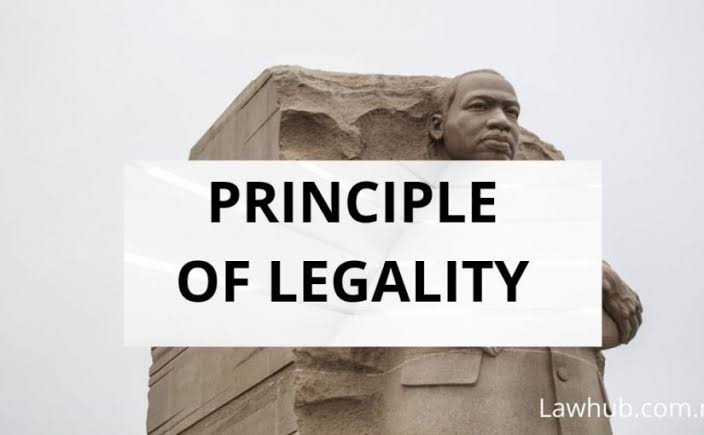N.B. This article is particular to Nigeria.
Principle of Legality
The principle of legality represents the standard of living that is expected of a criminal statute. It is captured in the Latin phrase “Nullum crimen sine lege, nulla poena sine” which roughly translates as “No crime or punishment without the law”. It represents the yardstick by which the legitimacy of criminal law can be measured.
In essence, the principle of legality implies that criminal liability band punishment should be based only on a prior enactment of a prohibition that is expressed with adequate precision & clarity. The principle stands on 3 legs which are:
- Substantive provision of law
- Procedures for the enforcement
- International recognition.
The principle of legality has international flavors. In other words, it is a universal concept or due process in criminal law, meaning that whether we are civilized or not, it can be gathered from how much we comply with the principle of legality.
The doctrines that make up the legality principle include the abolition of existing common law penal doctrines, the prohibition of judicial creation of penal rules, special rules mandating that penal statutes be construed strictly, the prohibition of post facto laws, the due process bar on the retroactive application of judicial interpretations altering criminal rules & the due process invalidation of vague criminal statutes. It is designed to guarantee the primacy of law in criminal procedures so that neither state prosecution nor defendant are exposed to arbitrary bias.
International instruments
Basic principles of legality can be found in the universal declaration of human rights (UDHR), the European convention in human right (ECHR), the international covenant on civil and political rights and the Geneva constitution. In line with this, article 11 paragraph 1&2 of the UDHR (1948) focuses on the principle of legality.
The ICCPR Article15(1) provides “No one shall be guilty of any criminal offense on account of any act or omission which did not constitute a criminal offense under national or international law at the time when it was committed.
UDHR article 11(2) states “No one shall be held guilty of any penal offence on account of any act or omission which did not constitutes penal offence”.
ECHR article 7 also states that there should be “No punishment without the law” similar grounds were provided in protocol 1 of the Geneva conventions, 75(4)(c) 1977
Municipal provision
The concept of the principle of legality was also made reference to in section 36(5) CFRN 1999 which provides that a person should be presumed innocent until proved guilty. In other words, there should be no retroactive criminalization of events which were not crimes when they took place. It should be added that punishments cannot be backdated. The provisions of S.36(12) CFRN 1999 makes for this
S. 11 of the code makes for the effect of charges in law where it provides that ” A person shall not be punished forgoing or omitting to do an act unless the act or omission Constituted an offence under the law in-force when it occurred”.
Principle of legality represent ideal goals that all state institution and apparatus involved in the criminal justice system must conform with. It binds all agents of a state: the legislature, & executive especially. The agents used by the executive in the criminal justice system include then police, & prison warden and in the judiciary, it includes the judges. The principle of legality translates
- That punishment must be within the purview of the law (Written & clear). For instance, the patriot act which relates to cyber activities of the USA has been invalidated for vagueness. The communication decency act 1976 made to target indecent exposure of children to adult related works online has been invalidated. See also Aoko V. Fagbemi
- It’s laws must be published & not secretive. In this view, section 22 of the criminal code. State “ignorance of the law does not afford an excuse… Unless knowledge by known by the offender is expressly declared to be an element of the law.”
- It must not be retroactive. This is made for in the case of Udokwu v onugha & anor
- There must not be trail or punishment by analogy. If what the offender dies is not a crime in the community where it was carried out, then it cannot be a crime.
Relating this principle to our socio-political reality.
The socio-political realm is one of the vital aspects of life in the society and Nigeria as a nation. Thus, the sphere of legality may be said to be in juxtaposition with this realm. This affects areas such as –
- Arrest & incarceration in Nigeria
- Activities of SARS
- Pre-trail parade of suspects
- Public condemnation
- Military rule.
Contributed by: Abdulganiyu Ismail (AKA) Mastermind
Prepared and Written by: Ucheakonam Chijioke Joshua (CJ)


Leave a Reply